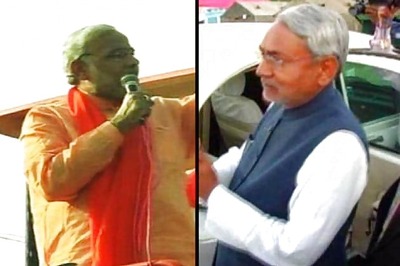
views
The manner and the timing of this announcement lend themselves to dissatisfaction. No consultation papers or parliamentary debates preceded these proposals. The public has been kept entirely in the dark. This is a decidedly regrettable approach to constitutional governance. An important change to public policy that will affect millions should not be relegated to the status of a slipshod edict and a few measly sound bites. Nor is the timing of this measure worthy of commendation. The revelation of the extension to the reservation regime on the eve of Assembly elections in five states has the whiff of political opportunism about it.
However, more than the form of the proposals, it is the substance that gives a cause for concern. In India, we have had over half-a-century of reservation. While there is no doubt that reservation is an important instrument of public policy capable of remedying inequalities, it is obvious that the system of blanket quotas in higher education has not proved to be an efficient antidote to the myriad economic and social difficulties of the disadvantaged communities.
In addition, the Supreme Court has also alerted us to the misuse of the quota system by 'creamy layer' of beneficiaries. The current system does not accommodate means-testing as a criteria, which is a glaring omission. For example, currently there are no safeguards to preclude an economically well-off citizen from availing of reservation.
Extending the quota raj even further to include OBCs into the fold misses the larger point. The focus of governmental efforts to create equal opportunities should be at the grassroots level rather than in higher education. Greater investment and financial aid in primary education is the answer. In the absence of creating easier access to primary education, the quota system is mere tokenism. While this is an easy way out, in effect it is an unfortunate short-cut destined to lead to greater social tension for ignoring the fundamental issues.
It was never the intention of the framers of the Constitution that reservation be entrenched for an indefinite period. The goal of a successful reservation policy can only be its eventual abandonment. In India, with the government looking at increasing reservation, unfortunately we are travelling in the very opposite direction.
A perpetuation of reservation for an indeterminate time-span does little to bolster the self-confidence of its intended beneficiaries. Conversely, it expands a culture of victimisation that reservation was designed to overcome. More than anything else, reservation is now reduced to a cynical game of votebank politics. Media reports have it that the Samajwadi Party and the BSP have welcomed the government's proposals. Should you be surprised? Not really. Both parties are heavily dependent on capitalising on caste-based politics.
There is another important equation to this. An increase in reservation will hurt India's emerging middle class. The effervescence of the Indian economy rests to a large extent on the shoulders of this section of the electorate. The way the world looks at India has changed largely due to the sustained effort of this middle class. It is a generation that is learning to value self-help and meritocracy more than familial status or background. The bastions of higher learning are its temples and mosques. Greater reservation can only stifle its aspirations and opportunities.
The UPA Government should reconsider its position on reservation. The complex problems of the socially disadvantaged cannot be solved by cosmetic and superficial gestures. Reservation was never meant to be a tool in electoral calculations. The government should aim to promote a meritocratic culture where caste and religion become increasingly irrelevant to success. In seeking to extend reservation, this ill-conceived measure represents everything that modern India should avoid.
Rishabh Bhandari is a lawyer at a global law firm in London. These are his personal views.first published:April 10, 2006, 10:31 ISTlast updated:April 10, 2006, 10:31 IST
window._taboola = window._taboola || [];_taboola.push({mode: 'thumbnails-mid-article',container: 'taboola-mid-article-thumbnails',placement: 'Mid Article Thumbnails',target_type: 'mix'});
let eventFire = false;
window.addEventListener('scroll', () => {
if (window.taboolaInt && !eventFire) {
setTimeout(() => {
ga('send', 'event', 'Mid Article Thumbnails', 'PV');
ga('set', 'dimension22', "Taboola Yes");
}, 4000);
eventFire = true;
}
});
window._taboola = window._taboola || [];_taboola.push({mode: 'thumbnails-a', container: 'taboola-below-article-thumbnails', placement: 'Below Article Thumbnails', target_type: 'mix' });Latest News
The UPA Government has dropped a real clanger with its proposal to increase reservation in central and state-funded universities from 22.5 per cent to almost 50 per cent. The HRD minister sprang out of the woodwork with this controversial initiative, taking everybody by surprise. After the stormy constitutional tussle of the last month, a period of self-imposed silence on the part of the Congress would have been prudent. The public has had enough of its ongoing shenanigans. Clearly, the party thinks otherwise.
The manner and the timing of this announcement lend themselves to dissatisfaction. No consultation papers or parliamentary debates preceded these proposals. The public has been kept entirely in the dark. This is a decidedly regrettable approach to constitutional governance. An important change to public policy that will affect millions should not be relegated to the status of a slipshod edict and a few measly sound bites. Nor is the timing of this measure worthy of commendation. The revelation of the extension to the reservation regime on the eve of Assembly elections in five states has the whiff of political opportunism about it.
However, more than the form of the proposals, it is the substance that gives a cause for concern. In India, we have had over half-a-century of reservation. While there is no doubt that reservation is an important instrument of public policy capable of remedying inequalities, it is obvious that the system of blanket quotas in higher education has not proved to be an efficient antidote to the myriad economic and social difficulties of the disadvantaged communities.
In addition, the Supreme Court has also alerted us to the misuse of the quota system by 'creamy layer' of beneficiaries. The current system does not accommodate means-testing as a criteria, which is a glaring omission. For example, currently there are no safeguards to preclude an economically well-off citizen from availing of reservation.
Extending the quota raj even further to include OBCs into the fold misses the larger point. The focus of governmental efforts to create equal opportunities should be at the grassroots level rather than in higher education. Greater investment and financial aid in primary education is the answer. In the absence of creating easier access to primary education, the quota system is mere tokenism. While this is an easy way out, in effect it is an unfortunate short-cut destined to lead to greater social tension for ignoring the fundamental issues.
It was never the intention of the framers of the Constitution that reservation be entrenched for an indefinite period. The goal of a successful reservation policy can only be its eventual abandonment. In India, with the government looking at increasing reservation, unfortunately we are travelling in the very opposite direction.
A perpetuation of reservation for an indeterminate time-span does little to bolster the self-confidence of its intended beneficiaries. Conversely, it expands a culture of victimisation that reservation was designed to overcome. More than anything else, reservation is now reduced to a cynical game of votebank politics. Media reports have it that the Samajwadi Party and the BSP have welcomed the government's proposals. Should you be surprised? Not really. Both parties are heavily dependent on capitalising on caste-based politics.
There is another important equation to this. An increase in reservation will hurt India's emerging middle class. The effervescence of the Indian economy rests to a large extent on the shoulders of this section of the electorate. The way the world looks at India has changed largely due to the sustained effort of this middle class. It is a generation that is learning to value self-help and meritocracy more than familial status or background. The bastions of higher learning are its temples and mosques. Greater reservation can only stifle its aspirations and opportunities.
The UPA Government should reconsider its position on reservation. The complex problems of the socially disadvantaged cannot be solved by cosmetic and superficial gestures. Reservation was never meant to be a tool in electoral calculations. The government should aim to promote a meritocratic culture where caste and religion become increasingly irrelevant to success. In seeking to extend reservation, this ill-conceived measure represents everything that modern India should avoid.
Rishabh Bhandari is a lawyer at a global law firm in London. These are his personal views.




















Comments
0 comment